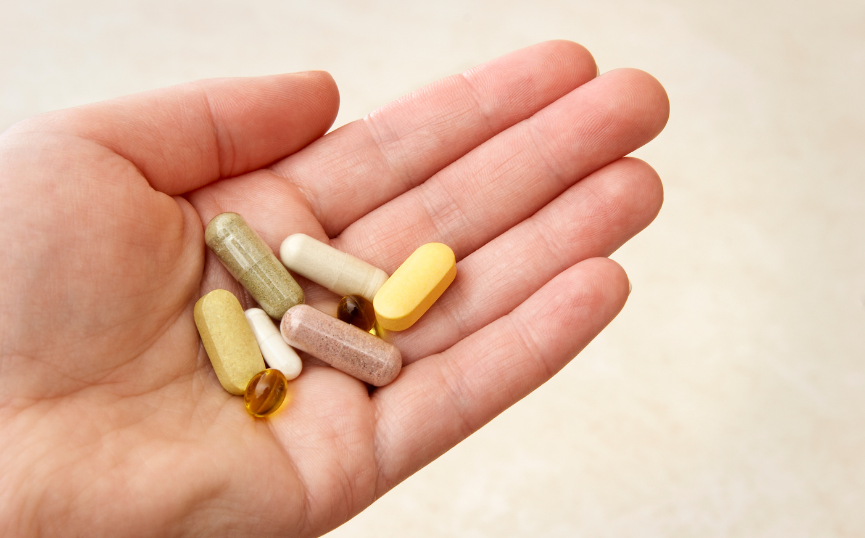How long does it take to feel the effects of vitamins/supplements?
The time it takes for dietary supplements to take effect is a frequently asked question, but there is no universal answer. Some supplements, such as melatonin or creatine, have a noticeable impact, while most do not produce explicitly perceptible effects. The timeframe for results can vary significantly depending on the type of supplement, its intended use, and individual factors.

"The dose makes the poison"
To understand the effects of dietary supplements, we need to be familiar with the concept of dose-response curves. The impact of any substance that influences our body depends on the amount taken—there is an optimal dosage range. Below this range, the desired therapeutic effect may not be achieved, while exceeding it can increase the risk of potential side effects. For some safer active ingredients (such as vitamins and minerals), this optimal range is broader, whereas for others (such as melatonin or creatine), it is narrower. In other words, melatonin and creatine carry a higher risk of side effects when taken in excessive doses.
Quality is the Key
Even naturally occurring active ingredients can be produced using different manufacturing processes.
For example, cold-pressed citrus extracts may contain phototoxic compounds if these are not specifically removed during processing. In contrast, steam-distilled citrus extracts contain little to no such compounds.
Another example is herbal extracts, where composition depends on the solvent used, which part of the plant was extracted, and the plant's origin.
For synthetically produced active ingredients (even those identical to naturally occurring ones), absorption depends on the carrier molecules they are bound to. For instance, different forms of vitamin A do not have the same absorption rates.
Absorption differences are further influenced by the supplement's form—whether it is a spray, tablet, capsule, or powder.
Once we ensure the quality of the active ingredients we use, we can then consider how long it takes to see results. In this article, we will outline what to look for when prioritizing quality and examine the expected timeframes for the most popular supplements to take effect.
Melatonin
Melatonin is a hormone that regulates our circadian rhythm, influencing the sleep-wake cycle.¹ It promotes feelings of drowsiness and may improve sleep quality. Certain plants, such as algae, alfalfa, tomatoes, rice, bananas, and cherries, naturally contain melatonin. However, extracting melatonin from these sources is uncommon and not cost-effective. Instead, it is industrially produced by breaking down the amino acid tryptophan.²
The various formulations available on the market primarily differ in capsule composition rather than the active ingredient itself.
There are fast-absorbing melatonin products³ that can induce drowsiness within 20–30 minutes. These immediate-release melatonin supplements are particularly useful for individuals who have difficulty falling asleep but can sleep through the night once they do.
Slow-release supplements maintain elevated melatonin levels in the blood plasma for approximately 7–8 hours.⁴ This duration is usually sufficient to cover an entire sleep cycle. Extended-release melatonin capsules are better suited for those who struggle to stay asleep, waking up frequently and having difficulty falling back asleep.
If you plan to supplement with melatonin, start with the lowest available dose, such as NOW Foods Melatonin 1 mg.

Pre-Workout Supplements
Pre-workout supplements, also known as "boosters," are specifically designed to rapidly enhance performance, increase energy levels, and reduce fatigue.
The primary active ingredient in most pre-workout formulas is caffeine, which starts working within 15–45 minutes, increasing alertness.⁵ Caffeine exerts its main effect through the sympathetic nervous system, which is responsible for the "fight or flight" response. This system is activated when the body perceives a threat, placing it in a heightened state of readiness—an effect that can be beneficial when facing intense mental or physical stress.
Pre-workouts may also contain vasodilators (ingredients that enhance blood flow and muscle "pump"), such as L-arginine, citrulline malate, or beta-alanine.⁶⁻⁸ Beta-alanine, in particular, works by increasing blood carnosine levels, which helps buffer acid buildup in muscles. These ingredients typically start working at the same time as caffeine.
Additionally, some pre-workouts contain creatine, which can improve strength during short, high-intensity activities (e.g., 1–12 rep ranges, 10–60 second sprints).⁹ However, creatine needs to accumulate in the body to deliver noticeable benefits. This is why sporadic, high-dose creatine intake has less impact than consistent daily intake (2.5–5 g per day).
Pre-workouts - especially due to their caffeine content - can be easily overdosed. Regular coffee drinkers are at an even higher risk of overconsumption. The best pre-workouts are not necessarily those that hit like a hardcore drop—as these often wear off quickly, leaving you craving another dose within 30 minutes. Instead, professional-grade pre-workouts provide sustained effects that last throughout the entire workout.
Pre-workout boosters are not recommended for cardio sessions where the goal is to maintain a low heart rate while maximizing effort. For aerobic training lasting over 60 minutes (such as running, cycling, or swimming), it is crucial to replenish electrolytes and carbohydrates through intra-workout supplements—which will be covered in the next section.
A high quality pre-workout supplement with caffeine: FA - Fitness Authority Xtreme Napalm Igniter Shot
A caffeine-free pump-enhancing performance booster: Zoomad Labs Moonstruck® II Zero
Energy Gels & Intra-Workout Supplements
During prolonged physical exertion, nutrient replenishment plays a crucial role - both for performance and strategic planning in competitions. For cardio sessions exceeding 90 minutes, well-timed electrolyte and carbohydrate intake provides instant energy and helps maintain endurance.¹⁰
Highly recommended for marathon runners: Science in Sport Gel Variety Pack - Isotonic Energy Gels
In contrast, nutrient intake during prolonged strength training is more of a personal preference. However, we encourage everyone to keep strength training sessions under 1.5 hours whenever possible. For this duration, intra-workout supplementation is usually unnecessary, as post-workout nutrition is far more important—whether through a protein-rich meal or a protein shake.
Creatine
Creatine is a naturally occurring compound found in meat that provides energy to muscles. Its effects, as mentioned earlier, are primarily noticeable during short, high-intensity efforts.²³ This is because creatine stores are depleted in the early phases of muscle contractions. Once these stores are exhausted, the body shifts to lactic acid fermentation for energy production.
The appearance of effects depends on the method of intake. Many start with a loading phase (20 grams daily for 5–7 days). This can naturally lead to faster results (effects may already be noticeable after 7 days), while with a daily dosage of 3–5 grams, it takes 3–4 weeks to reach maximum effectiveness. During the loading phase, the risk of side effects may increase, such as stomach discomfort and water retention.
Vitamin360’s recommendation is the long-established and most tested creatine monohydrate! For quality, choose: Universal Nutrition Animal Creatine
Amino Acids & Protein Powders
Protein powders and amino acids, especially BCAAs (branched-chain amino acids), with leucine being the most significant, are primarily used to support muscle protein synthesis—though some amino acids have specific effects, so it is advisable to research before supplementation.
For post-workout protein replenishment, muscle protein synthesis is stimulated almost immediately.¹¹ However, no single supplement alone should be expected to have a direct muscle-building effect.
Muscle building is a slow and continuous process: its prerequisites are adequate protein intake and progressively increasing training stimulus (progressive overload). If these two conditions are met—with or without protein powder—muscle growth will occur.
Multivitamins
Multivitamins contain a variety of vitamins and minerals, with the primary goal of meeting daily nutrient requirements. Since they are not designed to treat specific symptoms, their effects may not necessarily be noticeable. In certain cases—such as severe anemia or vitamin deficiencies—targeted therapy can lead to drastic improvement within 3–4 weeks.¹² Sometimes, multivitamins may also help reduce chronic fatigue and pain within this timeframe,¹³ ¹⁴ but only if these symptoms are caused by a deficiency of vitamins or minerals.
Healthy individuals are unlikely to feel any direct effects from multivitamins. That’s why we should think of them as our invisible guardian angels.
For a comprehensive, highly bioavailable Hungarian multivitamin, choose: GAL+ Multivitamin

Probiotics
Probiotics are "beneficial bacteria" that promote gut flora balance and digestive health.¹⁵ Their effects vary from person to person, typically appearing within a few days to several weeks, depending on the quality of the probiotic. Pro tip: Choose supplements containing clinically tested strains to reduce the risk of antibiotic resistance transfer. [Click here to read more.]
During antibiotic treatments, the gut flora can be significantly depleted. In such cases, taking probiotics can lead to rapid and noticeable results, such as reducing diarrhea and other digestive issues. Probiotics can also help with non-antibiotic-related digestive problems, providing similarly effective relief.
Probiotics positively influence the immune system, but this effect is less noticeable compared to digestive benefits.
For a clinically approved probiotic supplement containing tested bacterial strains, try: Now Foods Probiotic-10™ 25 Billion
Joint Support Supplements
Joint support supplements are designed to help reduce cartilage damage, joint pain, and tendon injuries. Most of these formulations contain glucosamine, chondroitin, and hyaluronic acid.¹⁶⁻¹⁸ Another supplement specifically known for its anti-inflammatory benefits is UC-II collagen. These four active ingredients form the foundation of joint protection, and all four should ideally be combined with absorption-enhancing and synergistic compounds, such as vitamin C, turmeric extract, and piperine.¹⁹⁻²⁰
Vitamin360’s Joint Support Recommendation: Now Foods Glucosamine & Chondroitin Extra Strength and GAL UC-II® Cartilage Complex
Comprehensive formula: Universal Nutrition Animal Flex Powder.
Even high-quality joint support supplements require time to take effect, typically 4–6 weeks.²² However, results can vary significantly from person to person. Pro tip: The effects are most pronounced when supplementation is combined with lifestyle changes and physiotherapy.²¹
- Savage RA, Zafar N, Yohannan S, et al. Melatonin. [Updated 2024 Feb 9]. In: StatPearls [Internet]. Treasure Island (FL): StatPearls Publishing; 2025 Jan-. Available from:
- Tordjman S, Chokron S, Delorme R, Charrier A, Bellissant E, Jaafari N, Fougerou C. Melatonin: Pharmacology, Functions and Therapeutic Benefits. Curr Neuropharmacol. 2017 Apr;15(3):434-443. doi: 10.2174/1570159X14666161228122115. PMID: 28503116; PMCID: PMC5405617.
- Mun JG, Wang D, Doerflein Fulk DL, Fakhary M, Gualco SJ, Grant RW, Mitmesser SH. A Randomized, Double-Blind, Crossover Study to Investigate the Pharmacokinetics of Extended-Release Melatonin Compared to Immediate-Release Melatonin in Healthy Adults. J Diet Suppl. 2024;21(2):182-194. doi: 10.1080/19390211.2023.2206475. Epub 2023 May 7. PMID: 37150895.
- Mun JG, Wang D, Doerflein Fulk DL, Fakhary M, Gualco SJ, Grant RW, Mitmesser SH. A Randomized, Double-Blind, Crossover Study to Investigate the Pharmacokinetics of Extended-Release Melatonin Compared to Immediate-Release Melatonin in Healthy Adults. J Diet Suppl. 2024;21(2):182-194. doi: 10.1080/19390211.2023.2206475. Epub 2023 May 7. PMID: 37150895.
- Institute of Medicine (US) Committee on Military Nutrition Research. Caffeine for the Sustainment of Mental Task Performance: Formulations for Military Operations. Washington (DC): National Academies Press (US); 2001. 2, Pharmacology of Caffeine.
- Bode-Böger SM, Böger RH, Galland A, Tsikas D, Frölich JC. L-arginine-induced vasodilation in healthy humans: pharmacokinetic-pharmacodynamic relationship. Br J Clin Pharmacol. 1998 Nov;46(5):489-97. doi: 10.1046/j.1365-2125.1998.00803.x. PMID: 9833603; PMCID: PMC1873701.
- Gough LA, Sparks SA, McNaughton LR, Higgins MF, Newbury JW, Trexler E, Faghy MA, Bridge CA. A critical review of citrulline malate supplementation and exercise performance. Eur J Appl Physiol. 2021 Dec;121(12):3283-3295. doi: 10.1007/s00421-021-04774-6. Epub 2021 Aug 21. PMID: 34417881; PMCID: PMC8571142.
- Ririe DG, Roberts PR, Shouse MN, Zaloga GP. Vasodilatory actions of the dietary peptide carnosine. Nutrition. 2000 Mar;16(3):168-72. doi: 10.1016/s0899-9007(99)00268-3. PMID: 10705070.
- Hall M, Manetta E, Tupper K. Creatine Supplementation: An Update. Curr Sports Med Rep. 2021 Jul 1;20(7):338-344. doi: 10.1249/JSR.0000000000000863. PMID: 34234088.
- Latzka WA, Montain SJ. Water and electrolyte requirements for exercise. Clin Sports Med. 1999 Jul;18(3):513-24. doi: 10.1016/s0278-5919(05)70165-4. PMID: 10410838.
- van Loon LJ. Role of dietary protein in post-exercise muscle reconditioning. Nestle Nutr Inst Workshop Ser. 2013;75:73-83. doi: 10.1159/000345821. Epub 2013 Apr 16. PMID: 23765352.
- Macdougall, I.C., "Iron deficiency anemia in chronic kidney disease," Nephrology Dialysis Transplantation.
- Pilz, S., et al. "Effects of vitamin D supplementation on muscle function and performance in athletes," British Journal of Nutrition, 2013.
- Kennedy, D.O. "B vitamins and the brain: mechanisms, dose and efficacy—a review," Nutritional Neuroscience, 2016
- Shahrokhi M, Nagalli S. Probiotics. [Updated 2023 Jul 3]. In: StatPearls [Internet]. Treasure Island (FL): StatPearls Publishing; 2025 Jan-.
- Clegg DO, et al. "Glucosamine, chondroitin sulfate, and the two in combination for painful knee osteoarthritis," JAMA, 2010.
- Richter M, et al. "The efficacy of hyaluronic acid in the treatment of osteoarthritis: a meta-analysis," Osteoarthritis and Cartilage, 2013.
- Crowley D, et al. "Effects of undenatured type II collagen on knee osteoarthritis: a randomized clinical trial," International Journal of Medical Sciences, 2009.
- Zeng C, et al. "The effects of curcumin on osteoarthritis: a meta-analysis," Journal of Nutritional Biochemistry, 2015.
- Shoba G, et al. "Biological effects of piperine: a review," Phytomedicine, 2013.
- Bennell K, et al. "Exercise and osteoarthritis," Australian and New Zealand Journal of Medicine, 2012.
- Berkson, BM, et al., "Use of Glucosamine and Chondroitin Sulfate for Treatment of Osteoarthritis," Journal of Rheumatology, 2008
- Kreider RB, Stout JR. Creatine in Health and Disease. Nutrients. 2021 Jan 29;13(2):447. doi: 10.3390/nu13020447. PMID: 33572884; PMCID: PMC7910963.


